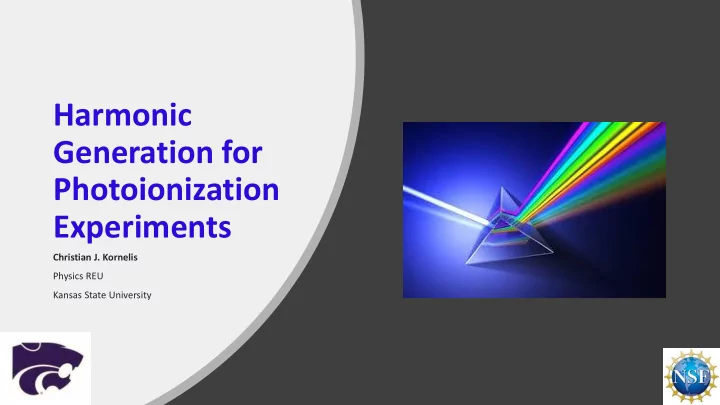

Harmonic Generation for Photoionization Experiments Christian J. Kornelis Physics REU Kansas State University
The Basic Setup for the KLS Photoionization Experiment V. Kumarappan
Femtosecond Pump-Probe Spectroscopy I. Vishik, P. Kamat • Uses of Pump-Probe Spectroscopy This process allows us to measure processes that occur at a picosecond timescale. • Necessity of High Harmonic Generation The use of Extreme Ultraviolet light for Photoionization Experiments is ideal Picture located at: https://www.quora.com/How-are-ultrafast-dynamics-identified-in-femtosecond-laser-spectroscopy
Supersonic Jet Expansion • The use of the jet is to create the non- linear medium for high harmonic generation • The velocity increases past the nozzle • Zone of Silence • Skimmer Picture available at: http://iopscience.iop.org/article/10.1088/0957-0233/23/10/105901
Detectors: The Use of Microchannel Plates Hamamatsu MCP Assembly manual available at: http://www.triumf.ca/sites/default/files/Hamamatsu%20MCP%20guide.pdf
Signal Readout Hamamatsu Phosphor Screen • The phosphor screen is made up of phosphor material coated onto a glass plate or a fiber optic plate • Phosphor plates are used to convert output signals from an MCP into visible image • The phosphor screen is placed about 1 mm away from the screen • The images observed on the phosphor screen can be imaged using a CCD camera, as well as by eyesight MCP Assembly manual available at: http://www.triumf.ca/sites/default/files/Hamamatsu%20MCP%20guide.pdf
Harmonic Generation With Vinod Kumarappan, and Tomthin Nganba Wangjam
High Harmonic Generation • High harmonics are generated in a gas or solid medium • How the high harmonic photons are generated 1. The electromagnetic laser pulse penetrates a gas. 2. The coulomb potential and the laser potential combine to allow tunnel ionization 3. The electron is accelerated by the electric field generated by the electromagnetic pulse The maximum harmonic photon energy is given: 4. The electron is forced back into the E c = I p + 3.17U p atom Where I p is the ionization potential, and U p is the 5. Due to conservation of energy the ponderomotive energy kinetic energy gained is released as high 2 = 9.337 x 10 -14 I [W/cm 2 ] ( λ [ μ m]) 2 harmonic pulses 2 /4 ω 0 U p [eV] = E 0 With E 0 , I, and λ being the strength, intensity, and wavelength of the driving field, respectively. Ren, X. (2013) Laser Driven Rotational Dynamics of Gas-Phase Molecules: Control and Applications Manhattan, KS Kansas State University
High Harmonic Chamber 3D design
Low Harmonic Generation • Parametric and "instantaneous “ nonlinear optical phenomena, in which the optical fields are not too large, can be described by a Taylor series expansion of the dielectric polarization density (dipole moment per unit volume) P(t) at time t in terms of the electrical field E(t): • Nonlinear optics (NLO) is the branch of optics that describes the behavior of light in nonlinear media, that is, media in which the dielectric polarization P responds nonlinearly to the electric field E of the light. The nonlinearity is typically observed only at very high light intensities (values of atomic electric fields, typically 108 V/m) such as those provided by lasers.
3 rd Harmonic Setup
5 th Harmonic Setup
Third Harmonic Generation In Argon Gas
Future Steps: Refurbish the vacuum chamber that will allow me to create high harmonics. Several step process • Alignment • Vacuum Differential • Electronic testing The next goal would then to mount the MCP/HH Chamber Acknowledgements: Vinod Kumarappan Tomthin Nganba Wangjam National Science Foundation Miller. D (1988) Atomic and Molecular Beam Methods (Volume one) New York, NY: Oxford University Press, Inc. Hillenkamp. M, Keinan. S, Even. U (2003). Condensation limited cooling in supersonic expansions. Journal of Chemical Physics, 118(19), 8699-8705
Recommend
More recommend